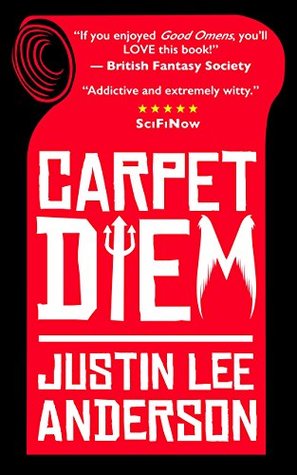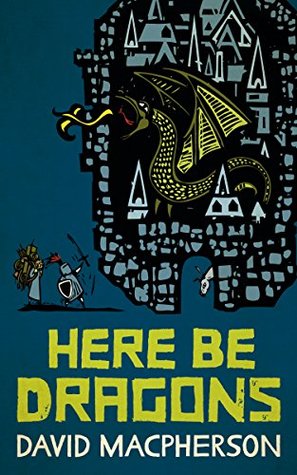|
Carpet Diem by Justin Lee Anderson is the story of Simon Debovar, a rich shut-in with an allergy to human contact (other than his drunk, lecherous Great Aunt Harriet) who gets drawn into a celestial competition between God and Satan that stands to usher in the end-times. He owns a very important rug, you see, and an angel and a demon show up at his house demanding that he choose which side gets it. The rug is stolen by a third party, and things spiral from there. The book uses a lot of elements you’d expect from the thriller genre, with many competing factions with murky and secret motives that are slowly revealed. As one character says, “Those who help you are not always your friends; those who oppose you are not always your enemies.”
This is an urban fantasy drawing from Christianity, but I wouldn’t call this a religious book, nor is religion used as the butt of jokes. Rather, it treats Christian elements as mythology and makes them its own with a little sass and parody to go around. I bring it up because using a real-world religion as the basis of a book’s mythos can be a touchy subject and it’s important to note that “Carpet Diem” takes a pretty neutral approach to the religion. It’s kind of like the movie Dogma in that respect, but with even less attention paid to the actual religion. Anyway, the book takes a fairly low-brow approach to humor. This is a book about drunk, horny people blundering their way through a world-saving adventure. Simon’s aversion to humanity and social awkwardness is a major source of humor, as is his instinct to assume that implausible worst about everyone he meets (such as jumping to the conclusion that the angel and demon who visit him at the beginning are planning to capture him and sell him into slavery based on absolutely no evidence). Aunt Harriet is a sexual wrecking ball. The ancient feud between pirates and ninjas even makes an appearance. Normally, I like to post a few choice quotes in these reviews to better demonstrate the style of humor. I failed you this time, and here’s why: The prose and humor in this book are incredibly smooth. The book just flows and builds on itself in a way that you can’t just pick out a funny sentence or paragraph. I was about 8% through the book before I even remembered I was supposed to be highlighting things, but everything is just so dependent on context that it’s hard to just throw some quotes at you. My advice is to read the first two chapters and see for yourself. If you want to see what happens when you cross “Dogma” with “The Big Lebowski,” or just need some comic urban fantasy in your life, give this one a read.
1 Comment
One of the staples of the fantasy genre is the unlikely hero. In comic fantasy, this hyperbolically becomes the implausible hero. “Here Be Dragons” by David Macpherson stars Orus, an old, fat, retired adventurer who changed careers to King’s gardener after impregnating a the first princess he ever rescued.
‘Oh yes,’ replied Mavis, moving in for the kiss. ‘It can’t happen the first time. Everyone knows that.’ Unbeknown to him at that magical moment, Orus was about to learn one of life’s most valuable lessons: virgins should not take safe sex advice from other virgins. Nine months later he would also learn that being a wandering adventurer didn’t bring in the steady income required for supporting a new family." He’s a hoarder with a man-chest full of regrets, and takes up a quest to save the last dragon because hey, why not? "Dreams weren’t for people like him. They were for princes and kings, knights and wizards. Dreams were there to push along children until they reached the point in their lives where it was too far to turn back, where joy in what you had was replaced by frustrated desire for what you didn’t. For people like him, dreams were there to break you." He’s being pursued by an alliance of vain, cruel, self-aggrandizing nominal heroes who want the honor of killing the last dragon. As you can imagine, this book takes joy in trope subversions. That’s where a lot of the humor comes from, combined with the hectic, slapstick action that comes from implausible heroes barely scraping by. We also have some delightful descriptions and analogies. "The other visitor to Orus’s room still stood in the doorway, a bit like a man watching a husband and wife argue and trying to pick the best moment to explain his jacket was on the back of one of their chairs." However, I’m sorry to say that this book left me feeling kind of lukewarm. It mostly succeeds as a comedy, but what it did right just wasn’t quite enough for me. My biggest complaint was actually the writing itself. There was a lot of flat prose, whereas comedy writing benefits from a bit of jauntiness. The prose was often awkward and labored, and stingy with the commas. Around once per chapter, the point of view changed without warning, which got disorienting. These things hurt the comic timing and delivery. It’s a death sentence for a joke when the reader needs to take a moment to parse out the face-value meaning of a paragraph. This was an inconsistent book for me. When it worked, it worked well. I particularly enjoyed the occasional chapter telling a side-story from a one-off POV. While I can’t give this one an enthusiastic endorsement, it’s worth downloading the sample and checking it out for yourself. The first few chapters are pretty indicative of what the rest of the book will be like. |
Review PolicyArchives
August 2018
Categories |



 RSS Feed
RSS Feed
